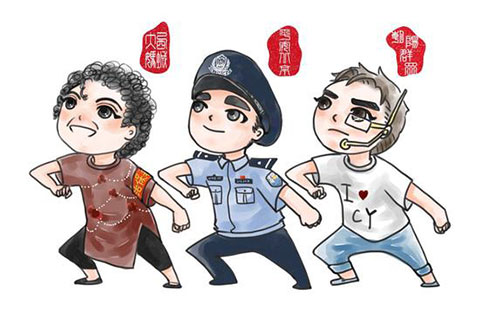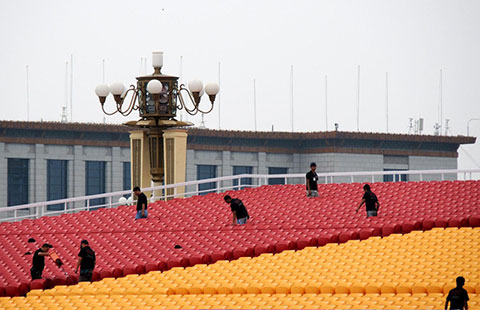China reaffirms non-acceptance of arbitration on S.China Sea: FM
Updated: 2015-08-25 00:10
(Xinhua)
|
||||||||
BEIJING - China on Monday reiterated that it will not accept nor participate in the arbitral proceedings unilaterally initiated by the Philippines.
China's position stands on a solid international legal base and will not change, said Foreign Ministry spokesperson Hua Chunying in a press release.
The Philippines filed its arbitration case at the Hague in early 2013.
The South China Sea Arbitral Tribunal Established at the request of the Philippines concluded the hearing on Jurisdiction and Admissibility on July 13 and has recently released a transcript of the hearing.
The Arbitral Tribunal has decided to provide China with the opportunity to comment in writing, by Monday (August 17, 2015), on anything said during this Hearing on Jurisdiction and Admissibility.
Hua said China has made clear its position in the "Position Paper of the Government of the People's Republic of China on the Matter of Jurisdiction in the South China Sea Arbitration Initiated by the Republic of the Philippines" dated December 7, 2014, which also declared that the Arbitral Tribunal does not have jurisdiction over this case.
She said there has been a long-standing agreement between China and the Philippines on resolving their disputes in the South China Sea through friendly consultations and negotiations.
Under the Joint Statement between the People's Republic of China and the Republic of the Philippines concerning Consultations on the South China Sea and on Other Areas of Cooperation, issued on August 10, 1995, both sides "agreed to abide by" the principles that "disputes shall be settled in a peaceful and friendly manner through consultations on the basis of equality and mutual respect" (Point 1); that "a gradual and progressive process of cooperation shall be adopted with a view to eventually negotiating a settlement of the bilateral disputes" (Point 3); and that "disputes shall be settled by the countries directly concerned without prejudice to the freedom of navigation in the South China Sea" (Point 8).
The two countries also reaffirmed to solve their disputes through negotiation and consultation in a series of bilateral documents, including the Joint Statement of the China-Philippines Experts Group Meeting on Confidence-Building Measures of 1999, the Joint Statement between the Government of the People's Republic of China and the Government of the Republic of the Philippines on the Framework of Bilateral Cooperation in the Twenty-First Century of 2000, the Joint Press Statement of the Third China-Philippines Experts' Group Meeting on Confidence-Building Measures of 2001, the Joint Press Statement between the Government of the People's Republic of China and the Government of the Republic of the Philippines of 2004 and the Joint Statement between the People's Republic of China and the Republic of the Philippines of 2011, according to Hua.
China and ASEAN countries including the Philippines signed the Declaration on the Conduct of Parties in the South China Sea (DOC) in Nov. 4, 2002.
Hua cited Article 4 of the DOC which stated that the parties concerned undertake to resolve their territorial and jurisdictional disputes by peaceful means, "through friendly consultations and negotiations by sovereign states directly concerned", in accordance with "universally recognized principles of international law", including the 1982 United Nations Convention on the Law of the Sea (UNCLOS).
In 2006, China made a declaration in pursuance of Article 298 of the UNCLOS, excluding disputes regarding such matters as those related to maritime delimitation from the compulsory dispute settlement procedures set by the UNCLOS, including arbitration, Hua said.
She said the Philippines violated the consensus it already reached with China and the commitments it made within the DOC, ignored that the key problem of the South China Sea dispute is related to territorial sovereignty and overlapped maritime rights and interests.
The Philippines' unilateral submission of the relevant disputes to compulsory arbitration, in breach of the consensus repeatedly reaffirmed with China as well as its undertaking in the DOC and in disregard of the fact that the core of the disputes between China and the Philippines lies in the disputes over territorial sovereignty and the overlapping of maritime rights and interests, constitutes a violation of international law, an abuse of international legal procedure, and a severe infringement upon the legitimate rights that China enjoys as a sovereign state and a State Party to the UNCLOS, said Hua.
The Philippines' unilateral initiation and obstinate pushing forward the arbitral proceeding, in an attempt to negate China's territorial sovereignty and maritime rights and interests in the South China Sea and to pressure China into making compromises regarding the relevant matters, is not only a pipe dream and will lead to nothing, but will also jeopardize the integrity of the UNCLOS and seriously undermine the order of international maritime law, she said.
She urged the Philippines to respect China's right, which is endowed by international law, of choosing means of dispute settlement, and return to the track of resolving relevant disputes in the South China Sea through negotiations and consultations.
- Typhoon Goni batters Philippines, kills four, displaces hundreds
- Former comfort women protest at Japanese embassy in Philippines
- Beijing reacts to reports of Japan supplying planes to Philippines
- Japan to lend Philippines $2b for rail project
- Chinese embassy rebuts NY Times editorial on China-Philippines dispute
- Philippines, Japan forge action plan for industrial cooperation
- Journey to the Silk Road - Philippines
- Tsipras formally resigns, requesting snap general elections
- China-Russia drill not targeting 3rd party
- UK, France boost security
- China demands Japan face history after Abe's wife visits Yasukuni Shrine
- DPRK deploys more fire units to frontlines with ROK
- DPRK, ROK trade artillery, rocket fire at border

 Giant panda Bao Bao celebrates two-year birthday
Giant panda Bao Bao celebrates two-year birthday
 Across America over the week (Aug 14 - Aug 20)
Across America over the week (Aug 14 - Aug 20)
 Stars in their eyes: leaders in love
Stars in their eyes: leaders in love
 A survival guide for singles on Chinese Valentine’s Day
A survival guide for singles on Chinese Valentine’s Day
 Beijing police publishes cartoon images of residents who tip off police
Beijing police publishes cartoon images of residents who tip off police
 Rare brown panda grows up in NW China
Rare brown panda grows up in NW China
 Putin rides to bottom of Black Sea
Putin rides to bottom of Black Sea
 The changing looks of Beijing before V Day parade
The changing looks of Beijing before V Day parade
Most Viewed
Editor's Picks

|

|

|

|

|

|
Today's Top News
China share plunge smacks world markets
30 heads of state to attend China's V-Day celebrations
ROK, DPRK agree to defuse tension after talks
Tsinghua University crowned 'wealthiest' Chinese school
China equities collapse sparks global markets sell-off
Targets set for regional integration
China advocates practical cooperation between LatAm, East Asia
Giant panda gives birth at Washington's National Zoo
US Weekly

|

|






